|
1.
CENTRAL AND WEST AFRICA
Crackdown on FCAD compliance
Operators in Cameroon report the authorities have
intensified enforcement of forestry regulations,
specifically the FCAD (Forestry Concession Allocation
Decree) and that this is impacting production for export
and local markets. Rigorous inspections and insistence on
strict legal compliance have compelled some Asian
operators to suspend production.
This clamp down, say millers, carries major implications
for the Dutch market where Azobé remains in high
demand. In the past Azobé was one of Cameroon’s
principal export species, shipped primarily in log form for
marine and outdoor enduses.
The Netherlands continues to be the main market for
Azobé using the hardwood for diverse infrastructure
projects such as dike reinforcement, oil pipeline supports
and increasingly for windmill mat installations. Demand is
particularly strong as the Ministry of Infrastructure and
Water Management increases dike heights in response to
the risk of coastal floods.
With Cameroonian mills facing reduced production buyers
of Azobé may turn to other West African suppliers,
potentially applying further pressure on Gabon’s Azobé
output. Despite these challenges Cameroon’s heightened
regulatory oversight aims to ensure sustainable and
transparent forestry operations.
ECTN application to benefit timber trade
On 1 January 2025 the Cameroon National Shippers'
Council (CNSC) launched its latest Electronic Cargo
Tracking Note (ECTN) issuance application bringing the
latest technology to the forefront of trade logistics. This
updated platform is particularly noteworthy for the timber
trade where efficient tracking and documentation of
shipments are essential to ensuring compliance with
international regulations and sustainable trade practices.
As timber remains one of Cameroon’s key export
commodities the ECTN system supports the industry's
growth by reducing administrative bottlenecks, improving
logistics and ensuring timely delivery of goods to
international markets.
See: https://www.cncc.cm/en/article/besc-3-0-new-version-
launched-856#myCarousel
New sawnwood marking requirement
The Ministry of Water and Forests, the Sea and the
Environment in Gabon plans to mandate that every bundle
of sawnwood for export carries an electronic readable
enabling tracking back to the log. In addition logs in the
CFAD/PAO system (Forest Concessions under
Sustainable Management (CFAD) and Operational Action
Plan) are GPS-marked. However, some millers question
the feasibility of tracing each board back to specific logs
through GPS codes especially given the ministry’s limited
capacity for field verification.
Industry syndicates such as UFIGA (Union des Forestiers
et Industriels du Gabon), UFIAQ (Chinese Association)
and local Gabonese trade groups are protesting the policy
warning of potential risks from arbitrary enforcement.
Government takes full control of Société Nationale des
Bois du Gabon
The government of Gabon has assumed full control of
Société Nationale des Bois du Gabon taking over from the
Gabon Special Economic Zone which was jointly
managed by Dubai-based Arise IIP and the Gabonese
government.
Brice Oligui Nguema, Transitional President of Gabon
stated the takeover demonstrates Gabon’s determination to
protect and sustainably manage its forest resources.
Marc Ona Essangui, Head of the non-governmental
organisation Brainforest and Vice-President of Gabon’s
Senate, stressed the importance of enhancing oversight
mechanisms within the timber sector. Essangui called for
the establishment of logging traceability systems, robust
monitoring framework and a forest code aligned with
international standards to ensure the sustainable
exploitation of Gabon’s forest resources.
See: https://commonwealthchamber.com/gabons-junta-gets-
direct-access-to-620-million-timber-industry/
Adapting to regulation enforcement
Winter in Europe dampens export prospects but demand in
the Middle East and in the Philippines for construction and
furniture species provides some stability. Vietnam’s
consistent appetite for Tali and Padouk continues, while
demand in China remains subdued.
Operators say effective regulatory adaptation, especially in
Cameroon and Gabon, will be crucial for maintaining
market access and ensuring legal and traceable timber
supply.
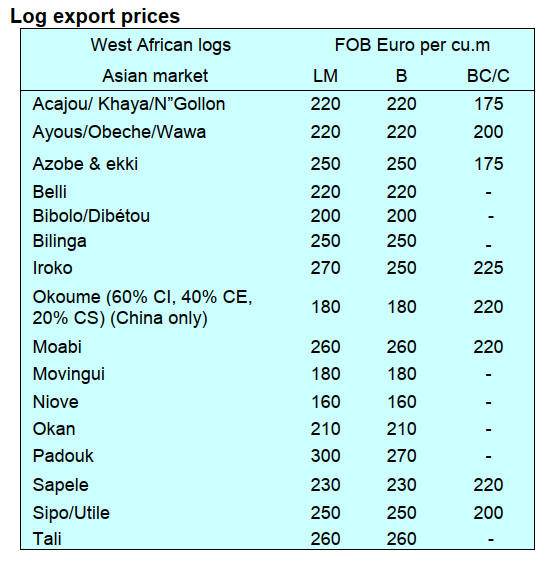 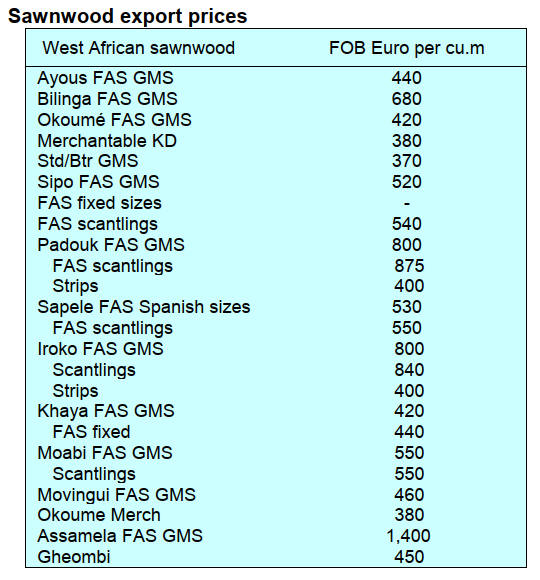
Through the eyes of industry
The latest GTI report lists the challenges identified by the
private sector in the Republic of Congo and Gabon.
See, https://www.itto-
ggsc.org/static/upload/file/20241217/1734418549204401.pdf
2.
GHANA
Business community assured of government
support
Ghana’s President, John Dramani Mahama, has reassured
the business community of his government’s support. He
said he would prioritise stability, predictability and an
investor-friendly environment for businesses in order to
drive economic growth.
In his inaugural address the President emphasised his
administration’s commitment to revitalising the economy
through reforms and policies designed to attract both local
and foreign investments.
President Mahama called on business leaders and
entrepreneurs to bring their investments to Ghana to
support the new economic model soon to be rolled out to
reshape the business environment to foster growth and
prosperity and to position the country as a key player in
the global economy. He pledged to look at the current tax
system and rationalise it to make it more transparent and
fairer.
The Association of Ghana Industries (AGI) has described
Ghana’s tax system as unfair and counterproductive,
particularly to the growth of local businesses. Chief
Executive Officer of the Association, Seth Twum-
Akwaboah, said Ghana’s current tax regime is a
disincentive to the private sector, a situation contributing
to low revenue generation for the State.
In a related development, an Associate Professor of
Finance at Andrews University, Michigan, USA, Professor
Williams Peprah, has suggested a property tax regime that
could significantly boost the country’s tax revenue-to-
Gross Domestic Produce ratio.
See: https://citinewsroom.com/2025/01/ghana-is-open-for-
business-again-mahama-tells-business-community/
and
https://www.myjoyonline.com/rationalize-ghanas-tax-system-
agi-tells-government/
Three top markets: Asia, EU and Africa
Three of Ghana’s wood export markets accounted for 86%
of total receipts in the third quarter 2024. Ghana earned a
total of Eur93.05 million from the export of 208,102 cu.m
of wood products during the period January to September
2024.
This value represented a 9.4% decline when compared to
Eur102,738 million recorded from 226,016 cu.m for the
same period in 2023 according to Timber Industry
Development Division (TIDD) data sources.
Of the country’s six market destinations for wood
products, Asia (57%), Europe (21%) and Africa (8%)
alone accounted for most of the total export receipt for
first nine months in 2024.
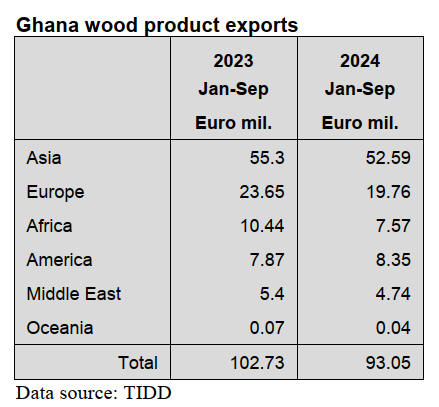
However, export volumes to America, the Middle East and
Oceania markets accounted for less than 15% of the total
export revenue in both 2023 and 2024.
The leading wood products exported included air and kiln-
dried sawnwood, rotary veneer, billets and plywood
(Overland) which together contributed 181,557cu.m
(Eur77.45million) and 193,807cu.m (Eur84.06million) in
2024 and 2023 respectively.
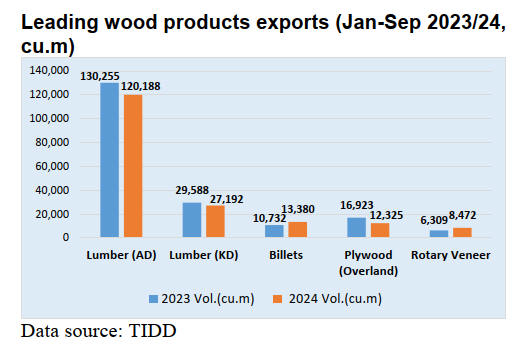
Billets and plywood exports to regional markets recorded
higher volumes in 2024 as against that of 2023. However,
the performance of sawnwood and plywood in 2024 fell
11% when compared to the corresponding volumes in
2023.
For the African markets the major destinations included
Egypt, Morocco and South Africa with the ECOWAS sub-
region importing Eur5.25 million from 13,886 cu.m of
total African wood products exported from Ghana from
between January and September 2024.
Final review of Forest Landscape Restoration Strategy
The Forest Services Division (FSD) of the Forestry
Commission (FC) held a consultative and validation
workshop with members of the Parliamentary Committees
on Environment, Science and Technology, Lands and
Forestry and the Ghana Timber Millers Organisation
(GTMO).
The stakeholder consultation was to finalise the review of
the ‘Ghana Forest Landscape Restoration Strategy’
(GFLRS). A similar meeting held earlier at the Forestry
Commission Training Centre (FCTC) was attended by
other stakeholder groups.
The consultation review focused on aligning the GFLRS
with Sustainable Development Goals (SDGs) related to
climate action, forest restoration and plantation
development. The GFLRS is a 25-year strategic plan
launched in 2016 to be reviewed every five years.
In his opening address, the Chief Executive of the FC,
John Allotey, declared that since the launch of the Strategy
close to a decade ago a lot has changed in the global forest
landscape in relation to climate change, illegal mining,
wildfires, agricultural impact and expectations from
international communities. He therefore urged participants
to be fully committed in their deliberations and contribute
to producing to a working document that represented the
aspirations and interests of the country.
In his closing remarks Mr. Allotey assured participants all
relevant suggestions made would be duly incorporated into
the final document.
See: //fcghana.org/fc-engages-stakeholders-on-revised-forest-
landscape-restoration-strategy/
Ministerial appointments
President Mahama has nominated Dr. Cassiel Ato Forson
as Finance Minister designate. The President has also
named John Abdulai Jinapor and Dominic Akuritinga
Ayine as Ministers designate for Energy and Attorney-
General respectively according to a statement issued by
the Acting Spokesperson to the President, Felix Kwakye
Ofosu.
Dr. Forson is a lawmaker in parliament, he is an economist
with deep insights particularly on the economy of Ghana,
a Chartered Accountant and a Tax Practitioner with over
20 years’ experience in the public and private sectors.
According to Deloitte’s “A Sneak Preview of 2025: What
Lies Ahead?” report, Ghana’s economy is on track to
regain macroeconomic stability by 2025. The audit and
advisory firm attributed this outlook to the government’s
fiscal consolidation measures and debt restructuring
efforts, which are beginning to yield results.
The Bank of Ghana Governor, Dr. Ernest Addison, has
also maintained that the Ghana cedi’s stability in 2025 will
largely depend on the economy and some monetary policy
measures under implementation by the Central Bank.
See: https://www.cnbcafrica.com/2025/ghanas-president-names-
cassiel-ato-forson-as-finance-minister/
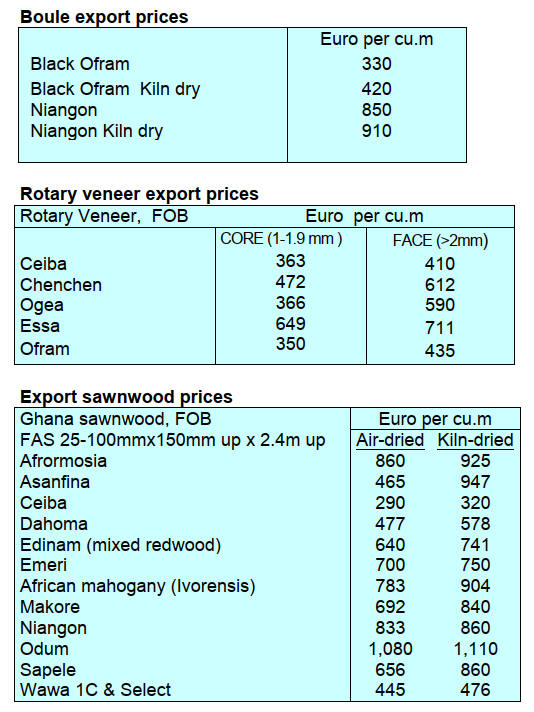 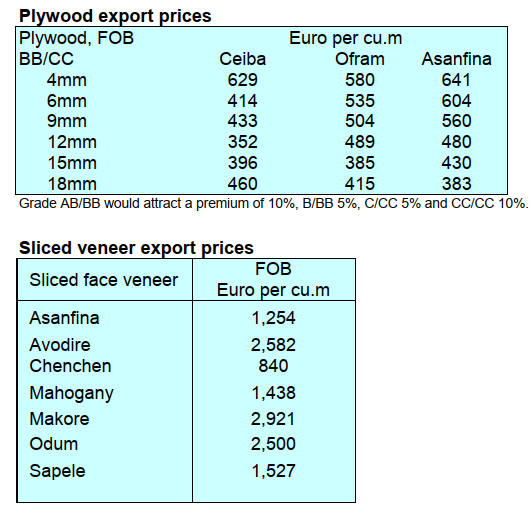
Through the eyes of industry
The latest GTI report lists the challenges identified by the
private sector in Ghana.
See, https://www.itto-
ggsc.org/static/upload/file/20241217/1734418549204401.pdf
3. MALAYSIA
Economy to remain resilient in 2025
Malaysia’s growth is set to reach around 5% in 2025 as
foreign direct investments and support from local funds
shield the economy from global risk according to the
Minister of Finance II, Amir Hamzah Azizan.
An executive of the Federation of Malaysian
Manufacturers (FMM) has said Malaysia’s economy is
poised for steady growth this year driven by strong
domestic demand, robust investment activities and growth
in exports and tourism despite potential global
uncertainties.
FMM President, Soh Thian Lai, noted that in the second
and third quarters of 2024 Malaysia’s gross domestic
product grew at 5.9% and 5.3%, respectively. The nation’s
GDP growth is forecast to be between 4.5% and 5% this
year.
He added “inflation is forecast to rise to 3% in 2025
influenced by domestic factors such as an increase in the
minimum wage, changes in the Employees Provident Fund
contributions for foreign workers, the extension of the
sales and service tax and subsidy rationalisation efforts.”
EUDR trial run
In a statement on its website the MTIB provides an up-
date on preparations for the EUDR. The MTIB says the
Malaysian timber legality assurance system (MTLAS),
implemented in 2013, is a system to verify the legality of
timber commodities in Peninsular Malaysia.
MyTLAS aims to assist exporters in fulfilling the due
diligence requirements, which involve all companies in the
timber product supply chain, including exporters,
suppliers, traders, processors and exporters.
The European Union has announced implementation of
the European Union Deforestation-free Regulation
(EUDR) will come into force in December 2025. To
ensure the efficient implementation of MyTLAS-
EUDR, MTIB conducted a trial run. As part of the
additional documentation requirements for the declaration
of MyTLAS-EUDR certificate details, exporters are
required to submit the following additional information:
Timber harvesting license information
Transport permit information
The scientific name of the timber species
Certification documents such
as PEFC/MTCS/COC or others
Due diligence and risk reduction assessments for
exporters, importers, suppliers and traders in the timber
commodities sector will be carried out in phases in 2025.
Implementing the new policy for MyTLAS certificates is
expected to begin on June 1, 2025.
See:
https://www.mtib.gov.my/index.php/en/announcement/pemaklu
man-pelaksanaan-mytlas-%E2%80%93-eudr-trial-run
Forestry professionals with technical and practical
knowledge
The vision of the Sabah Forestry Department (SFD) is
towards realisation of Sustainable Forest Management
(SFM) issues essential for preserving biodiversity,
regulating the climate and supporting the socio-economic
well-being of communities.
The Chief Conservator of Forests, Frederick Kugan,
emphasises that SFD is committed in protecting a
minimum 50% of the State’s land for sustainable forest
use, prioritising the need for a highly skilled workforce to
manage these resources.
The Sabah Forestry Institute (Institut Perhutanan Sabah)
(IPS) plays a vital role in achieving this goal by producing
forestry experts equipped with technical and practical
knowledge, aligning with Sabah Forest Policy 2018 and
the Sabah Maju Jaya Development Plan. To date, IPS has
trained 322 Forest Rangers and 1,324 Forest Guards, while
awarding over 5,722 certificates for short courses.
See:
http://theborneopost.pressreader.com/article/281625310912957
Sarawak forestry roadmap 2025
The Sarawak Forest Department (SFD) has drawn up a
2025 strategic roadmap with four key pillars. SFD
Director, Hamden Mohammad, said this initiative aims to
align Department actions with evolving challenges and
opportunities.
The roadmap says the Depatment will assist in
diversifying Sarawak’s economy by exploring forest
carbon initiatives as a new revenue source, enhancing both
the State’s economy and sustainability commitments.
Secondly, digital transformation will continue to improve
operational efficiency and sustainable forest management.
Hamden added the Department has pledged to plant 50
million trees by 2025 ensuring the preservation of
Sarawak’s forest ecosystems for future generations. Social
equity will also remain a focus by the Department through
community development programmes, including social
forestry and non-timber forest products, benefitting local
communities directly.
See: https://www.theborneopost.com/2024/12/18/forest-
department-sarawak-draws-up-four-key-pillars-for-2025-
strategic-roadmap/
Timber certification
Malaysian Timber Certification Council confirmed there
are 6.47 million hectares of MTCS – PEFC Certified
Forests in Malaysia as of November 2024. These forests
comprise 30 Certified Natural Forest (FMUs) and nine
Certified Forest Plantations (FPMUs). There are 370
companies holding MTCS – PEFC Certified Chain of
Custody (as at October 2024).
See:
https://www.freemalaysiatoday.com/category/nation/2025/01/09/
malaysias-growth-set-to-surpass-5-this-year-says-minister/
Mangrove restoration
Efforts to plant and replenish mangrove forests have
attracted corporate and non-governmental organisations.
However, some question how successful and how
significant scattered actions contribute to the reforesting of
mangroves in the country and there have been calls for a
roadmap for mangrove restoration.
It has been proposed that such a roadmap could include
information on potentially restorable coupled with
suggestions of interventions by government agencies, non-
governmental organisations, local communities and public
and private organisations.
See:
https://www.nst.com.my/opinion/columnists/2024/12/1152582/c
oordinate-mangrove-conservation
Through the eyes of industry
The latest GTI report lists the challenges identified by the
private sector in Malaysia.
See, https://www.itto-
ggsc.org/static/upload/file/20241217/1734418549204401.pdf
4.
INDONESIA
Export Benchmark Price (HPE) of Wood for
January
2025
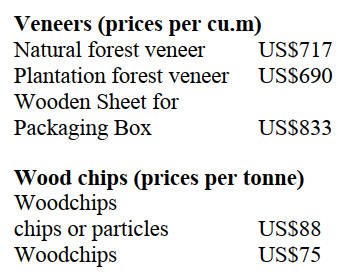
Processed wood (prices per cu.m)
Processed wood products which are leveled on all four
sides so that the surface becomes even and smooth with
the provisions of a cross-sectional area of 1,000 sq.mm to
4,000 sq.mm (ex 4407.11.00 to ex 4407.99.90)
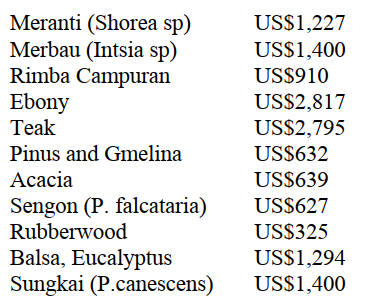
Processed wood products which are leveled on all four
sides so that the surface becomes even and smooth of
Merbau wood with the provisions of a cross-sectional area
of 4,000 sq.mm to 10,000 sq.mm (ex 4407.11.00 to ex
4407.99.90), US$1,500/cu.m
See: https://jdih.kemendag.go.id/peraturan/keputusan-menteri-
perdagangan-nomor-1684-tahun-2024-tentang-harga-patokan-
ekspor-dan-harga-referensi-atas-produk-pertanian-dan-
kehutanan-yang-dikenakan-bea-keluar
Launch of SVLK Plus
The Ministry of Forestry has launched the Legality and
Sustainability Verification System (SVLK) Plus which has
added traceability features. The SVLK Plus ensures that
every exported wood product can be traced to its origin
thus improving verification of legality and ensuring the
sustainability of forest management. Forestry Minister,
Raja Juli Antoni, said "With SVLK Plus we ensure that
every exported forest product has verifiable origin of the
raw materials.” The Director of Forest Product Processing
and Marketing Development, Ristianto Pribadi, explained
that SVLK Plus emphasises traceability features with
geolocation.
See: https://validnews.id/nasional/kemenhut-perkuat-pasar-
kayu-ber-svlk-di-dalam-negeri
Boosting domestic wood product consumption
The Ministry of Forestry will strengthen domestic
marketing along side promotion in the global market to
boost sales of wood products certified by the Legality and
Sustainability Verification System (SVLK) Plus.
Director General of Sustainable Forest Management at the
Ministry of Forestry, Dida Migfar Rida, emphasised the
importance of securing the domestic wood product market
and targeting the export market.
Director of Forest Product Processing and Marketing
Development of the Ministry of Forestry, Ristianto
Pribadi, revealed that to strengthen the domestic market
SiHutanku.id has been launched, an information system
that compiles all information systems on sustainable forest
management.
On the SiHutanku.id site there is a market place service for
SVLK-certified wood products. In addition, an E-Catalog
for the forestry sector is also available making it easier for
businesses, the forest industry and MSMEs to access the
market for government procurement of goods.
See: https://forestinsights.id/genjot-penjualan-produk-kayu-
kemenhut-perkuat-pemasaran-di-dalam-negeri/
Furniture producers optimistic for 2025 despite
challenges
Domestic furniture and craft manufacturers are relying on
exports to sustain growth in 2025 as the domestic market
is expected to remain bleak due to declining purchasing
power.
Chairman of the Indonesian Furniture and Craft Industry
Association (Asmindo), Dedy Rochimat, acknowledged
that the furniture industry sees positive prospects in 2025
driven by export demand.
Dedy explained that the optimistic outlook is also
influenced by the trend in Indonesia's furniture export
performance which reached US$1.61 billion as of the third
quarter of 2024. This marks an increase of 3.3% compared
to the same period the previous year. He added, Asmindo
will continue to participate in events such as the
International Furniture and Craft Fair Indonesia (IFFINA)
to promote Indonesian furniture products in the global
market.
Asmindo faces challenges in the domestic market
particularly due to a decline in the middle class and a
general weakening of purchasing power among
consumers. This situation has led to sluggish demand for
furniture and handicrafts.
Additionally, challenges arise from potential employment-
related pressures due to minimum wage increases. The
furniture industry is a labour intensive sector that
employed more than 962,000 workers in 2023 and
includes small, medium and large enterprises.
Asmindo has proposed the government provide incentives
to enhance industrial competitiveness, including export
incentives, strengthened raw materials sector, improved
supply chain and advanced manufacturing technology.
See: https://www.msn.com/id-id/ekonomi/ekonomi/pengusaha-
furnitur-optimistis-soal-kinerja-ekspor-2025-saat-daya-beli-
domestik-kian-suram/ar-AA1wwNls?ocid=BingNewsVerp
Indonesia plans massive reforestation targeting 6.5
million hectares
The Indonesian Government is planning a massive
reforestation programme in across Indonesia mainly
targeting 6.5 million hectares of land within forest areas,
according to Presidential Special Envoy for Energy and
Environment, Hashim Djojohadikusumo.
The Minister of Forestry, Raja Juli Antoni, will lead
reforestation in degraded forest areas and confirmed that
reforestation will be conducted on the targeted 6.5 million
hectares. The reforestation process will be conducted
through an intercropping system, including planting
several crops plants that can benefit the surrounding
community.
See: https://en.antaranews.com/news/337564/indonesia-plans-
massive-reforestation-targeting-65-million-ha-of-land
In related news, the Ministry is preparing forest areas for
bioethanol development in support of President Prabowo
Subianto's goal to improve people's welfare and promote
food and energy self-sufficiency.
The President has promised to allocate two million
hectares for bioethanol production as part of his efforts to
achieve energy security. The Minister said “it is now our
responsibility to prepare these forest areas, particularly for
bioethanol derived from Arenga pinnata (sugar palm/
areng palm).”
He added, this initiative is significant because palm offers
immense potential for the energy sector. The sap from
palm trees can be fermented into bioethanol, a renewable
energy source.
See: https://www.viva.co.id/english/1781572-minister-antoni-
indonesia-prepares-forests-for-bioethanol?page=2
Indonesia and Norway launch RBC-4 to reduce
emissions from deforestation
The Indonesian and Norwegian governments have
launched the fourth phase of contribution-based funding
(RBC-4) to advance efforts to reduce emissions from
deforestation and forest degradation (REDD+).
The launch of RBC-4 was made by the President's Special
Envoy for Climate Change and Energy, Hashim
Djojohadikusumo, Environment Minister, Hanif Faisol
Nurofiq, Forestry Minister, Raja Juli Antoni, and
Norwegian Ambassador to Indonesia and Timor-Leste Rut
Kruger Giverin.
Environment Minister, Hanif Faisol Nurofiq, explained
that RBC-4 includes funding of US$60 million for
Indonesia for the achievement of reducing greenhouse gas
emissions in the 2019-2020 period.
See: https://en.antaranews.com/news/337927/indonesia-norway-
launch-rbc-4-to-reduce-emissions-from-deforestation
Carbon market potential yet to be secured
Bambang Soesatyo, Chairman of the Board of Trustees of
the Indonesia Digital Carbon Association (IDCTA), said
that Indonesia has substantial potential in managing
carbon emissions and can play a crucial role in the global
carbon market. However, according to data from the
Financial Services Authority (OJK), carbon trading in the
country reached only Rp29.21 billion (US$1.82 million) as
of September 2023 with a volume of 460,000 tonnes of
CO2 equivalent.
He added,. "Indonesia aims to reduce greenhouse gas
emissions by 31.89% without international assistance and
43.2% with international support by 2030.
See: https://jakartaglobe.id/news/indonesias-carbon-trading-
market-shows-potential-but-falls-short-of-full-value
Developing non-timber products in mangrove areas
The Ministry of Forestry is actively promoting
community-managed businesses to utilise Non-Timber
Forest Products (NTFPs) found in the mangrove
ecosystem which includes 385.000 hectares designated
under the Social Forestry Programme.
Catur Endah Prasetiani, the Director of Social Forestry
Business Development at the Ministry of Forestry, stated
during a national dialogue held by CIFOR, approximately
385,064 hectares of mangrove areas are managed by 375
Social Forestry Groups (KPS).
She stated that the KPS, which operates near the mangrove
ecosystem, plays a vital role in protecting the area. In
addition to its ecological functions, such as acting as a
wave breaker and absorbing greenhouse gas emissions,
this ecosystem can also provide economic benefits without
the need to cut down or clear any land.
KPS primarily utilises mangrove the ecosystems for
ecotourism and silvo-fishery activities that support the
community's economy without harming the mangrove
forest.
See: https://www.antaranews.com/berita/4532938/kemenhut-
terus-kembangkan-hasil-hutan-bukan-kayu-di-kawasan-
mangrove?utm_source=antaranews&utm_medium=desktop&ut
m_campaign=popular_right
Credit plan for labour intensive industries
Chief Economic Affairs Minister, Airlangga Hartarto,
announced a series of programmes and incentives aimed at
sustaining economic growth, including a Rp20 trillion
(US$1.3 billion) credit facility for labour intensive
industries.
Industries eligible for the credit programme include
textiles, garments, footwear, furniture, food and beverages
and children’s toys. Companies must employ a minimum
of 50 workers to qualify for the programme.
The government has also introduced an economic package
for labour intensive sectors offering microloans ranging
from Rp500 million to Rp10 billion.
See: https://jakartaglobe.id/business/government-unveils-13-
billion-credit-plan-for-laborintensive-industries
Government-university synergy for forest protection
The Ministry of Forestry was recently visited by
representatives from the Forestry Faculty of the
Agriculture Institute of Bogor (IPB) to explore
opportunities for cooperation in environmental and
forestry preservation.
Forestry Minister Raja Juli Antoni stated "Good public
policies are essential so it is crucial for the government to
forge cooperation with various parties, including
universities.
According to the ministry's statement the meeting
addressed various potential areas for cooperation such as
adopting a smart forestry approach to monitor forest fire
risks and developing systems supportive of food security
and environmental protection. The Forestry Ministry and
IPB also assessed the possibility of cooperating in the
management of Forest Area with Special Purpose and the
conservation of biodiversity.
See: https://en.antaranews.com/news/340442/indonesia-seeks-
government-university-synergy-for-forest-protection
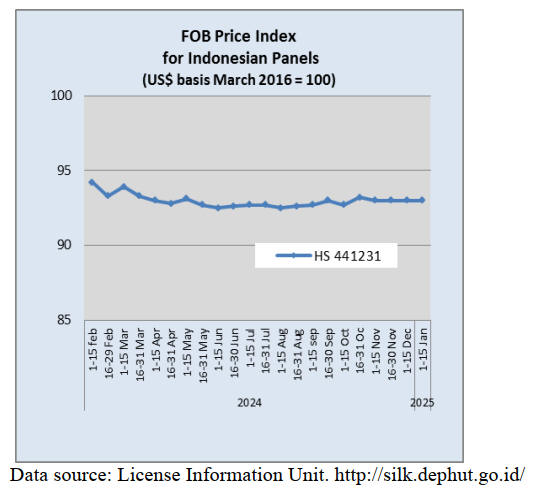
5.
MYANMAR
New Landscape for the natural resources trade
The ITTO correspondent writes: the landscape of the
natural resources trade has been reshaped in recent years,
shifting focus from timber to rare earth elements. Timber
had consistently been among Myanmar's top five export
commodities since 1990. Between 2012 and 2014, timber
export figures peaked at approximately US$700 million
annually just before the log export ban was enforced at the
end of March 2014.
Since then, export figures have gradually declined,
dropping below US$100 million for the first time in 2024.
Historically, Myanmar’s forestry sector has benefited from
effective forest management practices guided by skilled
forestry professionals.
The primary factor behind this decline is growing market
denial from key markets driven by concerns over the
legality of products and economic sanctions imposed
following the 2021 military takeover.
If market access continues to be denied alternative markets
will become a priority. However, this approach faces
significant obstacles, including restrictions on banking
services with Myanmar, which are under scrutiny by the
Office of Foreign Assets Control (OFAC).
In 2019–20 just before the State Administration Council
took the power, approximately 35–40 companies
purchased around 15,000 tons of logs from the Myanma
Timber Enterprise. The government kept the logging
pause from 2021 to 2023 and by 2024–25 the annual
harvested quantity has fallen to around 5,000–6,000 tons.
Last month, a workshop focusing on the development of
private forests, sustainable timber production, plantations
and wood-based industries was held at the Forest
Department in Nay Pyi Taw. Observations suggest that
prioritising alternative markets would be more pragmatic
than reactive advocacy efforts aimed at regaining access to
traditional markets.
The future of Myanmar’s timber and forestry sector
largely hinges on political stability, international relations
and the country’s ability to control illegal logging.
If Myanmar can establish more stringent enforcement
mechanisms and build stronger ties with countries open to
trade its forestry sector may continue to function, albeit
within a more limited market. However, without
substantial regulatory reform and investment in
sustainable practices the sector risks further degradation
which could threaten long-term viability and global market
acceptance.
Myanmar’s timber trade and forestry sectors are at a
crossroads, contending with international sanctions,
shifting markets, and domestic challenges.
Looking ahead, strengthening domestic regulations,
promoting local value-added processing and seeking
alternative forms of certification may offer pathways to
sustain the industry while addressing conservation and
sustainability goals. However, significant political and
economic challenges remain that must be addressed for
meaningful progress.
Source: Personal comments by the ITTO correspondent
World Bank: Myanmar faces overlapping crises
Myanmar's development trajectory has reversed sharply
due to overlapping crises. The 2021 military takeover
disrupted a decade of economic growth and reforms
leading to widespread conflict and displacement.
The UN estimates 18.6 million people, including six
million children need humanitarian aid with recent
cyclones exacerbating the crisis. Economic growth
remains stagnant, projected at just 1% for 2025. Inflation,
unemployment and poverty are rising, while disruptions in
trade, manufacturing and public services have hit
households hard.
Food security is worsening, with 42% of farming
households fearing food shortages. Public spending on
health and education has halved since 2020, limiting
human capital development. Skilled worker migration and
declining foreign investment further constrain long-term
prospects, signaling a prolonged recovery ahead for
Myanmar.
See: https://www.worldbank.org/en/country/myanmar/overview )
Electricity power cutsextended
The domestic media in Myanmar has reported the country
is grappling with worsening power outages. Admiral, Tin
Aung San, blamed the crisis on multiple factors including
“terrorist’ destruction” of the national grid, declining
natural gas production, delayed maintenance and natural
disasters. He announced that major cities are now divided
into blocks receiving limited electricity on a rotating
schedule due to supply shortages.
Yangon households are grouped into three blocks
receiving eight hours of electricity daily, while Mandalay
Region residents receive just six hours. Even the residents
of Capital experienced a power cut for the first time at the
beginning of 2025.
See: https://www.irrawaddy.com/news/burma/worsening-power-
cuts-plunge-myanmars-cities-into-
darkness.html#google_vignette
6.
INDIA
Modest inflation in
November
The annual rate of inflation based on the India Wholesale
Price Index (WPI) was 1.89% in November 2024. The
positive rate of inflation in November 2024 was primarily
due to increases in prices of food products, other
manufacturing, textiles and machinery and equipment.
Out of the 22 NIC two-digit groups for manufactured
products in November, 10 saw an increase in prices, 10
groups saw a decrease in prices and 2 groups witnessed no
change. Some of the important groups that showed month
on month price increases were manufacture of food
products; furniture; non-metallic mineral products;
pharmaceuticals, medicinal chemical and botanical
products and electrical equipment.
Some of the groups that witnessed a decrease in prices
compared to October 2024 were basic metals, rubber and
plastics products, chemicals and chemical products,
computer, electronic and optical products, motor vehicles
and trailers and semi-trailers.
The WPI for woodbased panels declined in November but
the index for sawnwood rose. The price index for veneer
sheets in November was at around the same level as in
October.
See: https://eaindustry.nic.in/pdf_files/cmonthly.pdf
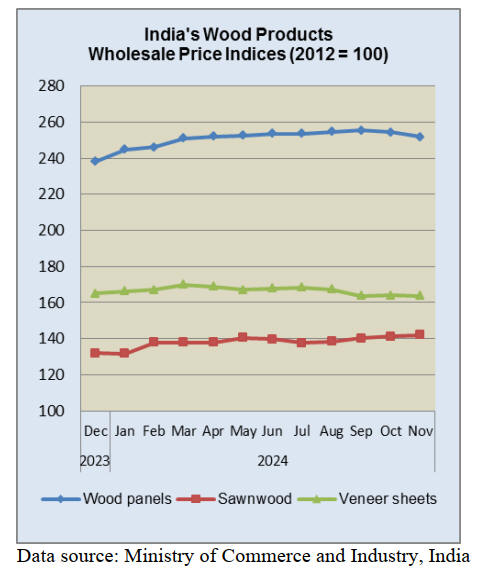
Roll-out dates for new Standards
The deadline for implementation of the new Standards has
been confirmed. The implementation dates for the timber
sector are understood as follows:
Date: 14 January 2025
IS 3513 Resin Treated Compressed Wood
Date: 11 February 2025
IS 1659 Block Board
IS 12823 Prelam Particleboard
IS 3087 Particleboard
IS 124406 MDF
IS 3097 Veneered Particleboard
Date: 28 February 2025
IS 303 Plywood
IS 20202 Flush Doors
IS 710 Marine ply
IS 5509 Fire Retardant ply
IS 1328 Decorative ply
IS 4990 Shuttering ply
It is understood the authorities in India are not in favour of
any further extension which has caused panic in some
sectors and many industrialists have approached the
government. The domestic plywood, MDF and
particleboard manufacturers have, through their
federations, conveyed that they are okay with the new
standards and implementation, the date of should not be
further extended.
In contrast, some major furniture manufacturers in India
and some raw material suppliers for the furniture industry
have approached the government through their
associations and have explained the likely negative impact
of the implementation and that it should be postponed.
It is understood that as of 10 January 2025 no foreign
wood panel manufacturer has been issued with a BIS
License. Countries such as Thailand and Indonesia have
raised their concerns at the WTO citing non-transparency
issues. The Indian government has said that bilateral
meetings with Thai and Indonesian officials will be
conducted to resolve this issue.
In addition to the list of wood based panels covered by the
new Standard there are several specialty board products
categorised as plywood category that are very difficult to
manufacture in India so are imported but it is not yet clear
how these imports will be handled under the BIS/QCO.
The correspondent writes “another important thing is that
still, out of roughly 2400 plywood factories in India, only
about 800/1,000 factories have a QCO license. The big
question is what happens to rest?” He continues “there will
be a meeting in New Delhi in mid-January with all
stakeholders and any developments will be reported at the
end of January.
Forest and tree cover increase
The Minister for Environment, Forest and Climate
Change, Shri Bhupender Yadav, recently released the
‘India, State of Forest Report 2023 (ISFR 2023). The ISFR
has been published by the Forest Survey of India (FSI) on
a biennial basis since 1987. The report says India's total
forest and tree cover has increased by 1,445 sq km since
2021, reaching 25.17 per cent of the total geographical
area in 2023, according to the latest government data.
The India State of Forest Report (ISFR) 2023, released
recently also said that India has achieved an additional
carbon sink of 2.29 billion tonnes compared to 2005
levels.
As part of its climate plans and Nationally Determined
Contributions (NDCs) to meet the Paris Agreement goals,
the country has committed to creating an additional carbon
sink of 2.5 to 3 billion tonnes through additional forest and
tree cover by 2030.
See: https://pib.gov.in/PressReleasePage.aspx?PRID=2086742
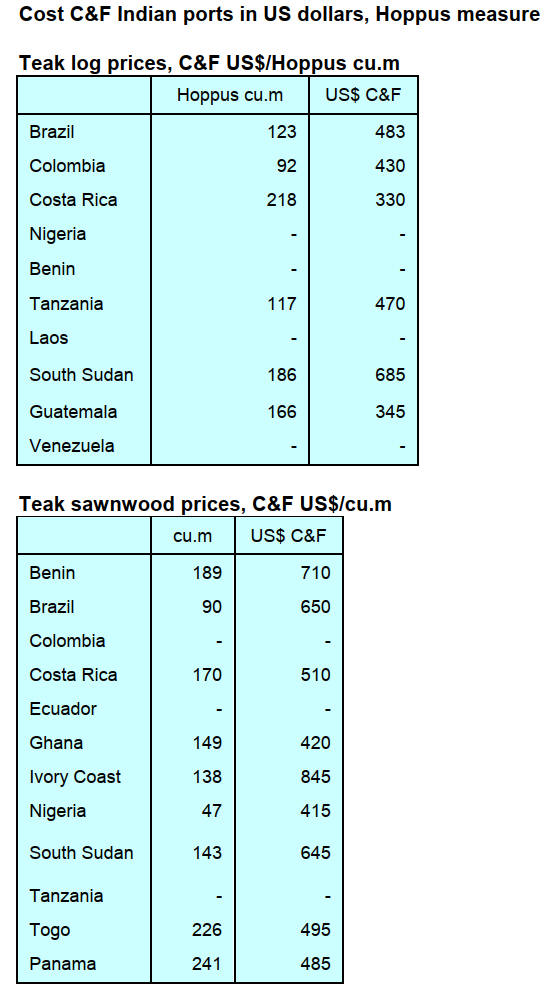
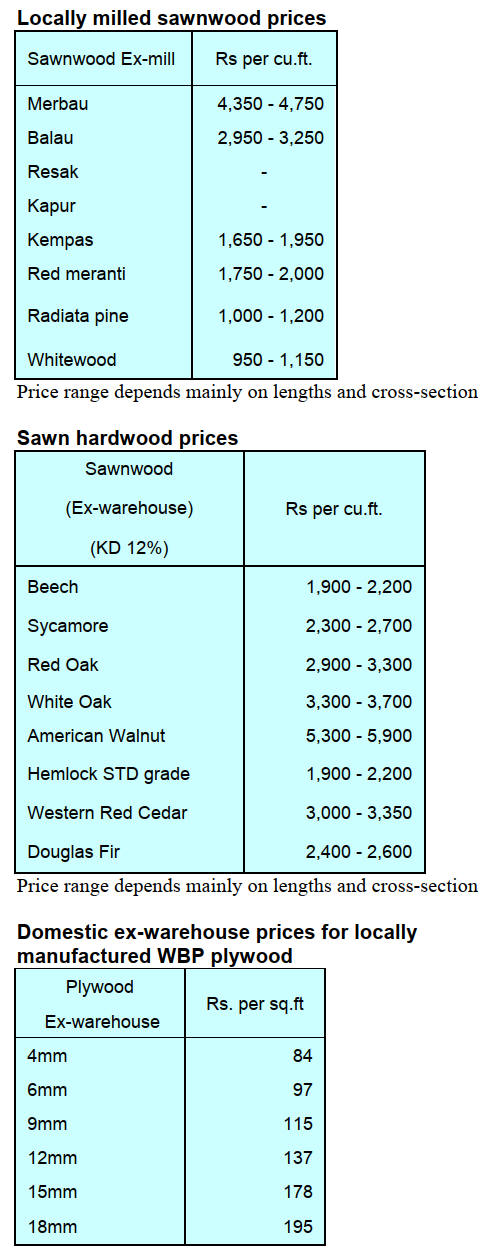
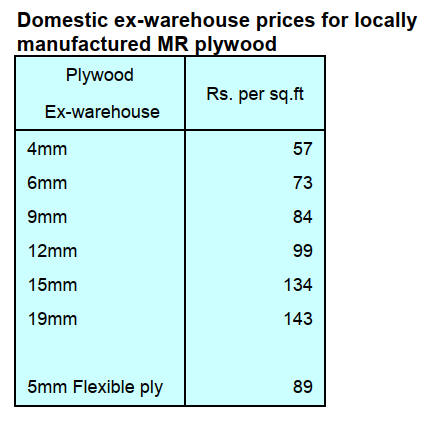
7.
VIETNAM
Wood and wood product (W&WP)
trade highlights
According to Vietnam Customs, December 2024 exports
of W&WP reached US$1.55 billion, up 6% compared to
November 2024 and up 16% compared to December 2023.
WP exports alone, fetched US$1.1 billion, up 7.5%
compared to November 2024 and up 15.5% compared to
December 2023. In 2024, W&WP exports amounted to
US$16.25 billion, up 21% compared to 2023 of which WP
exports accounted for US$11.2 billion, up 22% compared
to 2023.
Vietnam’s imports of wood raw material in November
2024 was 469,800 cu.m, worth US$149.9 million, down
8% in volume and down 5% in value compared to October
2024. Compared to November 2023 imports increased by
12% in volume and 8% in value. In the first 11 months of
2024 imports of wood raw material reached 5.08 million
cu.m, worth US$1.64 billion, up 25% in volume and 19%
in value over the same period in 2023.
Vietnam’s NTFP exports in November 2024 continued to
increase reaching US$67.50 million, up 11% compared to
October 2024 and up 3% over the same period in 2023.
The W&WP exports to Australia in November 2024
earned US$11.8 million, down 0.1% compared to
November 2023. In the first 11 months of 2024 W&WP
exports to the Australian market totalled US$146.2
million, up 11% over the same period in 2023.
Office furniture exports in November 2024 earned US$35
million, up 47% compared to November 2023. In the first
11 months of 2024 exports of office furniture reached
US$289 million, up 18% over the same period in 2023.
In November 2024, W&WP imports to Vietnam stood at
US$231 million, down 2% compared to October 2024, but
up 14% compared to November 2023. In the first 11
months of 2024 W&WP import values totalled at US$2.5
billion, up 26% over the same period in 2023.
Vietnam's poplar imports in November 2024 were
estimated at 30,600 cu.m worth US$12.2 million, up 1% in
volume and 2% in value compared to October 2024.
Compared to November 2023, imports increased by 2% in
volume and 7% in value. In the first 11 months of 2024
Vietnam spent US$137.5 million on importing 348,700
cu.m, up 19% in volume and 14% in value over the same
period in 2023.
Imports of wood raw material from the US in November
2024 decreased slightly to 57,000 cu.m with a value of
US$26 million, down 3% in volume and down 1% in
value compared to October 2024, However, imports
increased by 16% in volume and 22% in value over the
same period in 2023. In the first 11 months of 2024
imports of wood raw material from the US reached
632,134 cu.m, with a value of US$275.4 million, up 32%
in volume and 33% in value over the same period in 2023.
Record exports of wood and non-timber forest
products (NTFP)
According to Vietnam’s Forestry Department, in 2024
W&WP and NTFP exports has reached a historic high of
US$17.3 billion. Among this total, W&WP exports
accounted for approximately US$16.3 billion while the
remaining portion was non-timber forest products. The
2024 trade surplus from forest product exports is projected
to be around US$14.4 billion.
This record-breaking export performance represents a 19%
increase compared to 2023 and surpasses the previous
record set in 2022 by more than 2%. In 2022, the total
export value of forest products reached US$16.9 billion,
with US$15.8 billion attributed to W&WP and the
remaining US$1.1 billion from NTFP.
Most W&WP categories recorded positive growth rates in
2024. Leading exports for the year was the wooden frame
seat category. By the end of November 2024 this product
earned US$3.1 billion, a 24% increase compared to the
same period in 2023.
Following this were living room and dining room
furniture, woodchips, bedroom furniture, wood-based
panels, floorings and kitchen furniture. All of these
product groups surpassed US$1 billion each in exports.
The United States continues to be the largest export
market for Vietnam’s W&WP exports accounting for over
55% of the total exports. According to Vietnam’s Forestry
Department W&WP exports to the US market have
experienced positive growth driven by increasing demand
and decreasing inventory levels in 2024.
Moreover, the shift in global supply chains, particularly
due to the US trade protection measures against Chinese
goods has opened up significant opportunities for
Vietnam’s wood products.
Other key markets such as China, Japan, South Korea and
EU remain crucial for Vietnam’s W&WP exports. These
markets, not only have high demand for wood products,
but also require goods that adhere to strict standards
regarding quality, design and sustainability.
Following the US was China, with exports reaching
US$1.9 billion, a 21% increase; Japan, with US$1.6
billion, up by 3%; South Korea, with US$722.4 million,
up by 0.6%; and the EU, with US$503 million marking a
27% growth.
At the end of 2024 W&WP exports continued to show
strong growth. In the week from December 10 to
December 17 exports reached over US$390 million,
reflecting a 5% increase compared to the previous week.
Among this exports of wooden furniture alone reached
US$250 million marking an increase of over 2% compared
to the previous week.
Wooden furniture exports in this period were directed to
several key markets. The US remained the leading market,
with exports reaching US$200 million, up by 4%
compared to the previous week. Following the US, Japan
imported nearly US$9 million worth of wooden furniture,
though this was a 5% decrease compared to the previous
week. South Korea showed a positive growth of 3%, with
exports amounting to US$5.5 million, while the UK saw a
decline of 11%. Canada, on the other hand, experienced a
significant drop of nearly 30%.
See: https://vietnamagriculture.nongnghiep.vn/wood-exports-set-
a-record-surpassing-17-billion-usd-d414834.html
Challenges in the wood supply chain
The legal origin of wood products is one of the most
essential requirements for Vietnam's two main export
markets, the US and the EU. This is considered a vital
factor for export enterprises.
According to a survey by a Forest Trends led research
group, wood materials in Vietnam come from: domestic
planted forests (acacia, eucalyptus and rubberwood), wood
from domestic small farms, imported plantation timber
(pine, ash, eucalyptus and acacia) and imported natural
forest timbers.
Many wood products in the group of bedroom furniture,
office furniture, kitchen and wooden furniture parts
exported to the EU are processed from areas that were
previously forests converted to rubber plantations. When
using this wood source, businesses face challenges in
traceability, transparency and accountability especially the
requirement to clearly state the names of all types of wood
used in exported products.
Another factor is related to the legality of imported wood
raw material sources including wood names and
commercial invoices.
Some countries also require other evidence, such as
packing lists, wood raw material purchase invoices or
logging licenses. Through assessment, the expert team
found that the ability of businesses in Vietnam to present
relevant evidence remains a challenge.
Dr. Hoang Lien Son, Director of the Center for Forestry
Economics Research (Vietnamese Academy of Forest
Sciences - VAFS) said that for a long time the wood
industry has been struggling with the distinction between
"legality" and "legal" wood raw material sources.
Decree 120/2024/ND-CP amending Decree 102 has
removed confiscated processed wood from the list of legal
wood. Son said that this has significantly reduced risks
related to the origin of wood, especially wood raw
material, when participating in the supply chain and
exporting.
According to Son, legality is an attribute of wood,
meaning that all must comply with regulations from the
preparation of input materials (seeds, planting soil,
forestry measures, etc.). It is also necessary to provide
relevant evidence to ensure transparency, accountability
and traceability back to the planting area.
The QR code technology of the iTwood system solves
these problems. Each stage in the supply chain, including
production, harvesting, processing, commercialisation,
etc., has a QR code so that consumers and management
agencies can clearly understand the information. In other
words, when the wood is guaranteed to be “legal” or
“legality” is an attribute of the wood, the risks will be
automatically resolved.
Up to now, Decree 102 (or currently Decree 120) has been
the legal basis for Vietnamese enterprises to fulfill their
accountability responsibilities. This is considered a
"passport" for Vietnamese wood to enter the US and EU
markets. However, when purchasing wood raw material,
many supply countries still use hard copy records and
documents instead of digital transformation in wood
traceability management.
Implementing the direction of Deputy Minister of
Agriculture and Rural Development Nguyen Quoc Tri,
aiming for a sustainable forestry industry and becoming a
high-value-added technical, economic sector, the
Department of Forestry has guided localities and
enterprises to remove bottlenecks related to the legality of
wood raw material, including the issuance of forest
planting area code.
See: https://vietnamagriculture.nongnghiep.vn/remove-the-
bottlenecks-in-the-wood-industry-supply-chain-d406028.html
Vietnam has first forest production unit code
Professor Vo Dai Hai considers the digitisation of forest
plantation areas associated with database construction a
significant step forward, helping the wood industry adapt
to increasingly high international standards.
The Vietnamese Academy of Forest Science (VAFS) has
just coordinated with the Department of Agriculture and
Rural Development of Tuyen Quang Province to grant a
forest production unit code certificate for raw materials to
Yen Son Forestry Company Limited at the 3-year review
conference of the 2021-2025 Cooperation Programme
between the two units.
The code granted covers an area of 1ha, planted with pure
hybrid acacia since 2022, in the raw material forest
planting area of Team 821, Dao Vien commune, Yen Son
district. Information on the planting area coordinates is
accurately determined by the iTwood System and certified
by the Tuyen Quang Provincial Forest Protection
Department.
It is the first forest production unit code granted to forest
owners in Vietnam, within the programme piloted by the
Ministry of Agriculture and Rural Development in 5
provinces: Bac Giang, Lang Son, Phu Tho, Tuyen Quang
and Yen Bai.
"The issuance of forest production unit codes contributes
to information transparency, promoting the export of wood
and forest products," said Mai Thi Hoan, Deputy Director
of the Department of Agriculture and Rural Development
of Tuyen Quang, hoping that, combined with the project to
build Tuyen Quang into a high-tech forestry area, the
locality will become a forestry development pole in the
North of the country.
Analysing this issue further, Prof. Dr. Vo Dai Hai,
Director of VAFS, said that when forest production unit
codes are assigned to wood lots entering the supply chain
the organisation and development of a legal wood supply
chain and traceability will be more convenient, cost less,
creating a digital platform for production and business
database of planted forests, digital transformation, strong
connection with the market and improving production and
business efficiency.
Granting planting area codes is an important requirement
to make transparent information about the origin of
products and the technology used to create those products.
This is one of the mandatory requirements in the context
of international integration and participation in the global
supply chain.
In Vietnam, the granting of planting area codes for
agricultural crops has been implemented according to the
Law on Cultivation 2018 and Decision 3156/QD-BNN-TT
dated August 19, 2022 of the Minister of Agriculture and
Rural Development. Thanks to this legal corridor, many
agricultural products, especially fruits, have increased in
export in recent years. For forestry, the issue of wood
traceability was raised quite early, according to the
provisions of the Agreement between the Government of
Vietnam and the Government of the United States on
Illegal logging and timber trafficking.
For the EU, Vietnam also participates in the Voluntary
Partnership Agreement (VPA) and is implementing the
construction of the VNTLAS timber legality assurance
system. Most recently, the European Commission adopted
the EU Deforestation Regulation (EUDR) on December 6,
2022. Accordingly, enterprises producing and using wood
raw material for processing must build and develop a legal
timber supply chain that does not cause deforestation. This
is a mandatory requirement for exporting goods to the EU.
In addition, other export markets for wood and wood
products from Vietnam, such as Japan, Korea, China, etc.,
also require strict control and traceability of wood origin.
“From these facts, it can be seen that the issuance of forest
production unit codes in the current context in Vietnam is
extremely necessary and urgent,” said Prof. Dr.Vo Dai
Hai.
Deputy Minister of Agriculture and Rural Development
Nguyen Quoc Tri has promptly directed the Forestry
Department and VAFS to study the experience of issuing
codes for agricultural crop growing areas to digitise the
process of issuing codes for forest growing areas, moving
towards building a database to manage all forest resources
in Vietnam.
Based on Decision No. 2260/QD-BNN-LN dated July 9,
2024, the Forestry Department and VAFS will implement
the task in 2 phases: The pilot phase, within 24 months,
will issue temporary guidance documents on the issuance
and management of forest production unit codes for raw
materials to draw experience and perfecting the system of
legal documents, before expanding nationwide.
Phase two, from 2026 onwards, the process of issuing and
managing forest production unit codes will be
implemented nationwide.
After nearly 4 months of active participation, with high
determination towards sustainable forestry development,
as well as completing the goals and tasks of the industry in
2024, the Forestry Department, Department of Agriculture
and Rural Development, Forest Protection Sub-
Department, local authorities, businesses and people in 5
pilot provinces have had the first forest production unit
codes.
Based on the iTwood system, wood enterprises collect and
store legal records of wood from upstream suppliers
(forest owners, wood exporters, etc.) to the production
process of finished products. All information about the
origin and legality of wood will be shown through the
plantation area code.
In the long term, the plantation area code will be an
important input for activities such as granting sustainable
forest management certificates, paying for forest
environmental services or adapting to strict international
regulations such as EUDR (EU Deforestation-free
Regulation).
Dr. Ha Cong Tuan, Chairman of the Association of
Agricultural Economics and Rural Development and
former Permanent Deputy Minister of Agriculture and
Rural Development, commented that Vietnam still has
about 1 million hectares of forestry land for forest
regeneration. The potential for new planting in our country
is not much, because in this 1 million hectares, more than
300,000 hectares are rocky mountains and many wetlands.
"According to the recently issued national forestry plan,
Vietnam's forest area is stable, ensuring a 42-43%
coverage rate. Therefore, digitising management work is a
necessary and feasible task at this time," Tuan emphasised.
See: https://vietnamagriculture.nongnghiep.vn/vietnam-has-first-
forest-production-unit-code-d405680.html
Certified forests boost farmer incomes
Due to the increasing demand for wooden products, many
farmers in Thanh Hoa province have switched from
traditional forestry to FSC-certified forestry. This shift has
enhanced sustainable forest management and harvesting
according to FSC standards, creating a traceable, secure
supply of materials while ending deforestation-based
timber exploitation.
According to the Thanh Hoa Department of Agriculture
and Rural Development, the province has over 641,000
hectares of forest, including 56,000 hectares of large
timber forest and 260,000 hectares of planted forest.
Partnerships with enterprises are proving effective, helping
many households escape poverty through forestry.
Mr. Nguyen Dinh Thai, Head of the Forest Use and
Development Department (Thanh Hoa Forest Protection
Sub-Department), stated: "To increase farmers’ income
from forestry, the Department of Agriculture and Rural
Development will implement policies to support seedlings
and tissue culture, develop high-quality timber plantations,
and aim for sustainable certification. The support policy
for certification will provide VND300,000 per hectare for
areas over 300 hectares.
Additionally, we will focus on accumulating concentrated
forestland to produce timber, linking the entire value chain
from planting, caring, harvesting, processing and product
consumption."
The department is also working with local authorities to
promote participation in large timber forest plantations
with FSC certification, encouraging cooperative and group
formation to manage, protect and certify forests. This will
establish concentrated raw material areas with FSC
certification.
According to Mr. Thai, after several years of
implementation, Thanh Hoa province now has over 28,400
hectares of forest certified under FSC, involving 4,670
households. There are also seven value chains linking
forest owners (households and groups) with processing
factories.
Thanks to certification and livelihood models many
households in mountainous areas have risen out of poverty
through forestry.
By the end of 2025 Thanh Hoa aims to expand its planted
timber forest area to 125,000 hectares, with an additional
25,000 hectares of planted timber forest and 10 hectares of
bamboo and rattan certified under FSC. According to Mr.
Thai developing FSC forest certification has opened the
door for Thanh Hoa’s timber products to export to
European and U.S. markets thereby improving the income
of forest owners in mountainous areas. With each
harvesting cycle farmers can earn between VND 160-170
million per hectare.
See: https://vietnamagriculture.nongnghiep.vn/fsc-forest-no-
more-worries-about-price-pressure-d405863.html
8. BRAZIL
Advances in Brazilian Forest Management
The Brazilian Forest Service (SFB) says significant
progress has been achieved in the country's forest
management in 2024. In partnership with the National
Bank for Economic and Social Development (BNDES) the
first Brazilian restoration concession with carbon credits
was established in the Bom Futuro National Forest in the
State of Rondônia in the Amazon Region.
This project involves the restoration of 17,000 hectares
and an investment exceeding BRL600 million for
restoration and maintenance of the areas as well as the
sequestration of 6.5 million tons of carbon equivalent.
Additionally, the first Federal forest concession contract in
the Atlantic Forest was signed for the Irati National Forest,
in the State of Paraná covering 3,018 hectares and
incorporating the potential for carbon credits. Community
forest management and the bioeconomy benefited over
2,000 families involved in 10 community enterprises
within conservation units, settlements, quilombola
territories and indigenous lands.
In 2024, the SFB launched an Environmental
Regularisation Panel an online platform that provides an
overview of environmental regulations focusing on
requests to join the Environmental Regularisation
Programme (PRA) and analysis of data declared in the
Rural Environmental Registry (CAR).
This platform enhances transparency regarding
environmental regulations, facilitates coordination with
other public policies and encourages social participation.
Other initiatives included the compilation of over 1,000
wood samples as a tool combat illegal trade and the
inauguration of the new SFB headquarters in Santarém,
Pará State in the Amazon Region funded through a
bilateral partnership between Brazil and Germany.
SFB also supported the strengthening of knowledge in
forestry through the "Forest Knowledge (Saberes da
Floresta)" platform, offering 18 courses. These efforts
reflect the commitment to conservation, sustainable
management and socioeconomic development in Brazil's
forest regions.
See: https://www.gov.br/florestal/pt-
br/assuntos/noticias/2024/dezembro/retrospectiva-2024-confira-
os-principais-avancos-da-gestao-florestal-brasileira
Encouragings States and Municipalities through forest
concessions
In 2024 the SFB disbursed over R$27 million from the
Federal Forest Concessions Fund. The funds were
distributed among states and municipalities where the
concessions areas are located with the majority allocated
to Pará and Rondônia States.
These funds, regulated under the Public Forest
Management Law (Law no. 11.284/2006) and Decree
12.046/2024 came from the sustainable exploitation of
forests and were divided among the Chico Mendes
Institute for Biodiversity Conservation (ICMBio) (40%),
States (20%), municipalities (20%) and the National
Forest Development Fund (FNDF) (20%).
The funds allocated to states and municipalities must be
used for promoting the sustainable use of forest resources.
To receive these funds municipal environmental
secretariats and state environmental agencies need to
develop a Resource Application Plan detailing projects
and activities to be undertaken.
These disbursements encourage economic and social
development by promoting sustainable forest
management. Pará State plans to use the funds for
initiatives such as Community and Family Forest
Management in 2025, environmental improvements and
training.
Municipalities like Itaituba, Faro and Terra Santa will
invest in environmental infrastructure, restoration of
degraded areas and sustainable income projects such as
agroforestry systems and the creation of meliponaries (bee
farms) with native species.
See: https://www.gov.br/florestal/pt-
br/assuntos/noticias/2024/dezembro/concessoes-florestais-
repassam-r-27-milhoes-para-estados-e-municipios-em-2024
Exporters face challenging logistics
The Brazilian Association of Mechanically Processed
Timber Industry (ABIMCI) is intensifying efforts to
address logistical issues faced by the timber sector,
particularly concerning shipment delays as a result of
action by shipping companies.
These include issues such as shipment postponements,
rollover booking and unjust detention charges, among
other complications.
In meetings held with shipowners in São Paulo State
several proposals were presented to addresse these issues
including extending the free time period to 45 days,
avoiding undue charges against exporting companies,
improving the accuracy and predictability of ship
ETA/ETD with direct communication with exporters,
maintaining the contracted freight rate even in cases of
shipment delays as freight rates often change at the end of
the month and better negotiation of detention charges
directly with export companies.
Additionally, discussions were held on the main reasons
behind the failed port calls and the need for joint action
between the productive sector and service providers to
minimise the financial losses. ABIMCI will continue to
seek further meetings with shipping lines to advance
negotiations and find solutions.
See:
https://abilink.abimci.com.br/ev/PTKDP/BM6/546e/w8KE9Kx7
yk/BQyw/
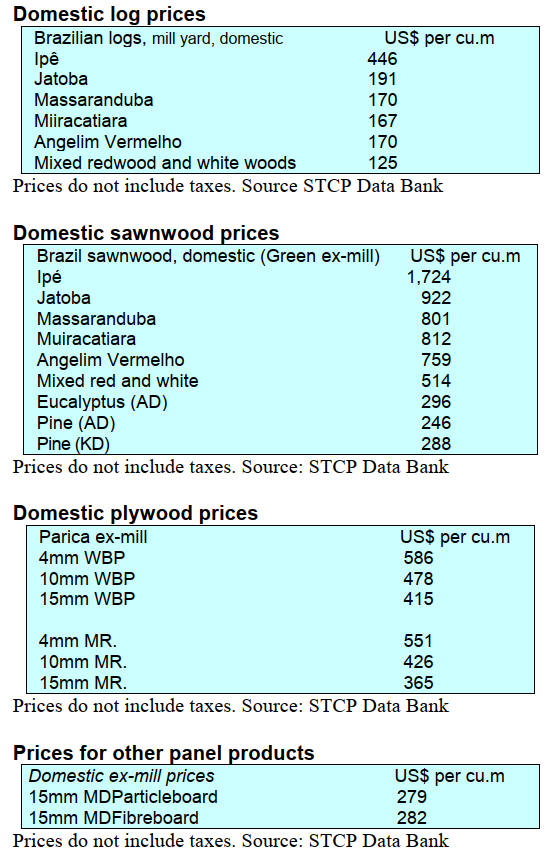
Export prices
Average FOB prices Belém/PA, Paranaguá/PR,
Navegantes/SC and Itajaí/SC Ports.
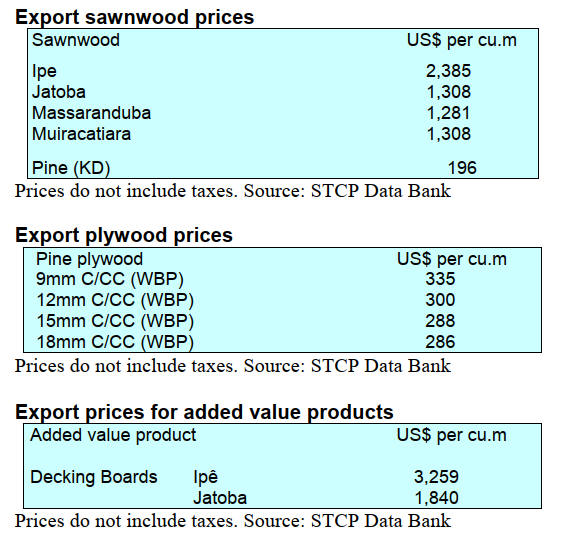
Through the eyes of industry
The latest GTI report lists the challenges identified by the
private sector in Brazil.
See, https://www.itto-
ggsc.org/static/upload/file/20241217/1734418549204401.pdf
9. PERU
Strengthening forest
management capacty in native
communities
In a joint effort to promote sustainability and legality in
the management of forest resources the Forest and
Wildlife Resources Oversight Agency (OSINFOR), in
collaboration with the Basel Institute on Governance
(BASEL) and the Regional Forest and Wildlife
Development Management (GERFOR) of Loreto, trained
communities and promoters in Regional Conservation
Areas (ACR).
In November, at the decentralised OSINFOR office in
Iquitos, the first phase of a training workshop was held on
the topics of forest crimes and negotiation and agreements.
The event was aimed at promoters of the Maijuna Kichwa,
Ampiyacu Apayacu, Alto Nanay Pintuyacu Chambira and
Communal Tamshiyacu Tahuayo ACRs.
The second phase, held in the Boras Native Community of
Pucaurquillo, expanded on the topics addressed in the first
stage, including institutional requirements, action against
corruption, wood traceability and good practices for forest
sustainability.
See: https://www.gob.pe/institucion/osinfor/noticias/1074563-el-
osinfor-y-aliados-fortalecen-capacidades-en-comunidades-
nativas-para-la-gestion-de-los-bosques-con-la-mochila-forestal
Incentives for verified good forestry practices
As part of the promotion of sustainable forestry practices
the Yamino Native Community in Ucayal was offered a
discount on the payment for the right to use forest due to
good management certified by OSINFOR, The community
obtained a 15% discount on the payment for the right to
use forests.
Incentives strengthen the fight against deforestation, said
the Head of OSINFOR, adding “we are convinced that the
enabling titles allow for managed and guarded forests.
Granting incentives such as the one obtained by the
Yamino community shows that legality generates benefits
for the country and producers.”
See:https://www.gob.pe/institucion/osinfor/noticias/1070673-
ucayali-comunidad-nativa-yamino-recibe-incentivo-economico-
por-buenas-practicas-forestales-certificadas-por-el-osinfor
SERFOR defines the yield of sawnwood and flooring
slats
In order to regulate the processing of wood resources in
the industry the National Forest and Wildlife Service
(SERFOR) established that the reference yield coefficient
for sawnwood from round logs shall be 56% while, in the
case of processing non-profiled flooring slats, the yield
shall be 41%. This rule is made in compliance with the
provisions of the Regulation for Forest Management. In
addition, if the miller declares that he can achieve a
transformation yield higher than that established, this must
be submitted to SERFOR.
Along with the approval of the reference yields the
“Methodological Guide for the determination of the Yield
Coefficient of logs to sawnwood and Non-Profiled Boards
was approved. The yield of wood products is reported in
Summary Table 3: Balance of Primary Transformation of
the Operations Book for primary transformation
operations, a document that must be sent monthly to the
Regional Forestry and Wildlife Authority (ARFFS).
This is the first time that the Peruvian national forestry
authority has established a performance coefficient for
sawing logs as a result of a performance study which
included field evaluations in the four regions with the
highest sawn wood production, such as Ucayali, Junín,
Madre de Dios and Loreto.
See: https://www.gob.pe/institucion/serfor/noticias/1075046-
serfor-fija-porcentaje-de-rendimiento-de-la-madera-aserrada-y-
en-tablillas-para-piso
Regional governments and SERFOR continue with
zoning
The National Forest and Wildlife Service (SERFOR
)through its Sustainable Productive Forests (BPS)
programme is providing technical assistance to nine
regional governments for the sustainable management of
forests.
The forest management units establish categories of
forests that are registered in the national forest registry,
such as: Permanent Production Forests, Local Forests,
Reserve Forests, Protection Forests, Forest on lands of
peasant and native communities and Forests on Private
Properties. Based on this, the exploitation rights (enabling
titles) are granted.
Through this system SERFOR provides technical advice
on the forest management of the regions of San Martín and
Ucayali. It also supports the regions of Áncash,
Cajamarca, Junín, Huánuco, Loreto, Madre de Dios and
Pasco with the forest zoning process. According to the
national survey in 2019 all Peruvian forest territory lacked
completed forest management plans.
See: https://www.gob.pe/institucion/serfor/noticias/1082612-
serfor-brinda-asistencia-tecnica-a-nueve-gobiernos-regionales-
para-el-process-de-zonificacion-y-ordenamiento-forestal
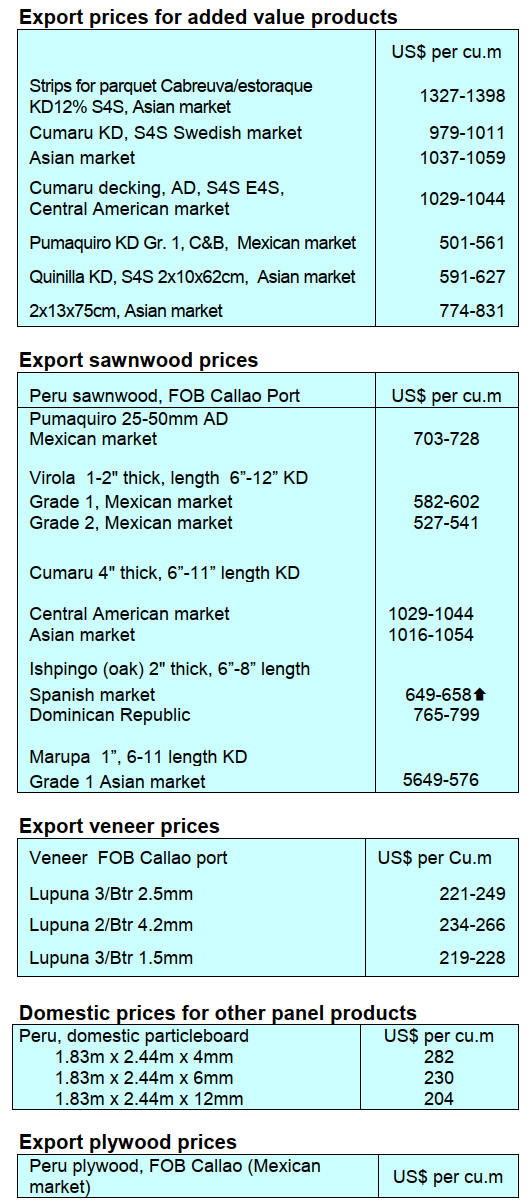 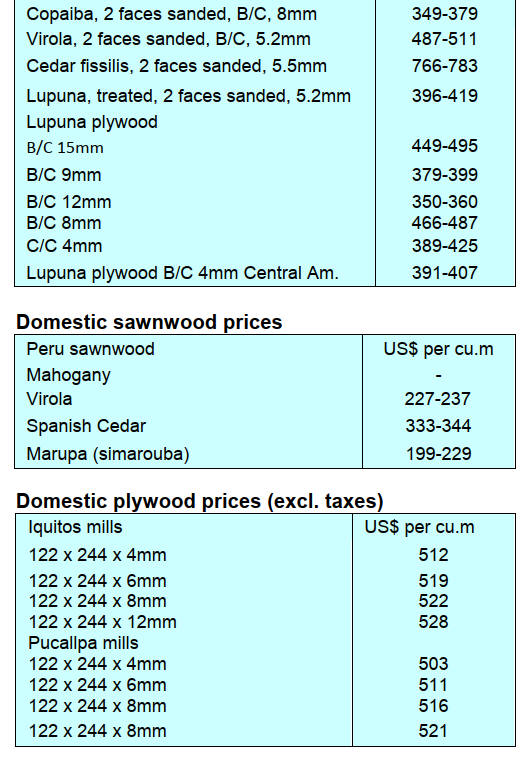
|